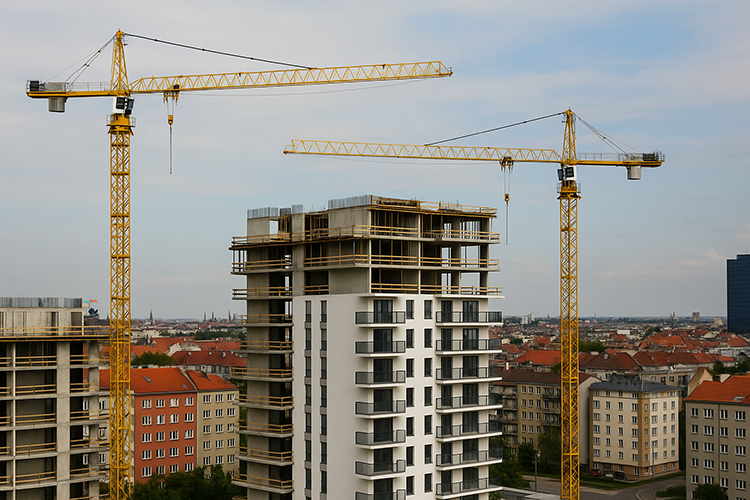2025-09-19
indicators

Czech construction activity accelerated in the first half of 2025, while new-home sales in the capital surged back toward pandemic-era highs. Developers and advisers say cheaper mortgages and revived household demand are bringing projects off the shelf, yet a historic collapse in building permits risks starving the pipeline over the next 12–24 months. Official data show construction output expanding strongly into mid-year, consistent with a cyclical rebound from last year’s slump and a favourable base effect. On the demand side, Prague’s primary market has tightened. Developers’ joint figures indicate roughly 4,300 new flats sold in the first half, up 23 percent versus H1 2024—the second-best half-year in 15 years—with average advertised prices in the city pushing above CZK 170,000 per sqm. The resurgence aligns with data from major residential players Central Group, Skanska and Trigema. Financing conditions have improved. Banking association figures show the average mortgage rate falling to about 4.6 percent in May, and the Czech National Bank has resumed gradual easing, cutting its policy rate to 3.5 percent in May. Cheaper credit has helped unlock deferred demand and boosted reservation activity since late Q1. Supply, however, is not keeping pace. While output is rising, the number of building permits issued in H1 2025 dropped to roughly 29,200—the lowest first-half total in 25 years and the first time below 30,000. Local business press and mortgage monitors warn that today’s sales momentum is drawing down “old” permitted stock, with fewer projects entering the pipeline. Sector voices continue to point at administrative bottlenecks. The new Construction Act and digital permitting were intended to speed approvals, but audits of the rollout have found delays, system flaws and staffing shortfalls at authorities. A parallel reform created the Specialised Transport and Energy Construction Authority (DESÚ) to fast-track strategic infrastructure; developers argue that a similar “single-hand” approach is needed for housing to achieve scale. The mixed picture is visible in the hard numbers. Starts and completions have lagged even as headline construction output improves, suggesting more renovation and engineering work in the near term and fewer fresh residential projects breaking ground. Data for early 2025 showed double-digit declines in started and completed dwellings versus the prior year, underscoring the pipeline risk. For now, pent-up demand, falling borrowing costs and modest real-income recovery are supporting transactions—especially for mid-market units and well-located new builds in Prague. But unless permitting accelerates through 2026, analysts caution that the market could face a renewed scarcity of deliverable product, prolonging affordability pressures and pushing prices higher. Bottom line: the Czech housing cycle is healing, helped by cheaper mortgages and a low comparison base, yet the sharp drop in permits is a red flag. Without a durable fix to approvals—and clearer, predictable timelines—today’s recovery risks stalling before it translates into sustained new supply. Source: CTK

